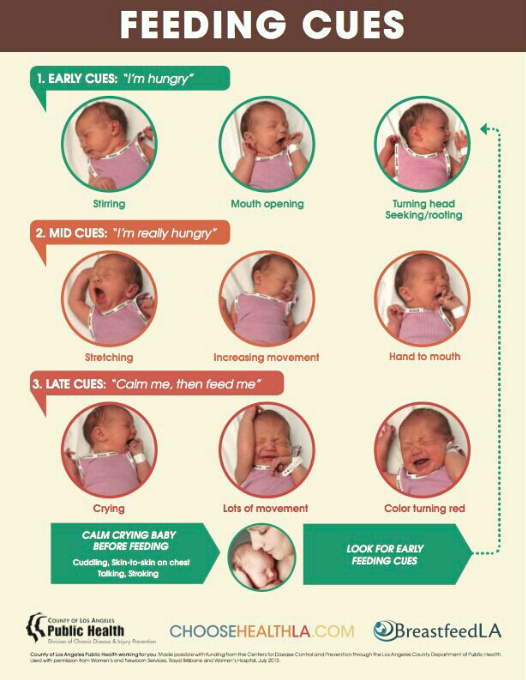
Learning Newborn Cues
Erin Burt
 One of the biggest mistakes that I was making early on after my daughter was born was thinking I had a few more minutes of sleep in the morning once I started to hear her stir around. I didn’t. I basically had right then and there to pick her up out of her bassinet and start feeding her. But I always tested it because I was experiencing a new level of exhaustion and was really clinging to that extra 10 minutes of snoozing.
One of the biggest mistakes that I was making early on after my daughter was born was thinking I had a few more minutes of sleep in the morning once I started to hear her stir around. I didn’t. I basically had right then and there to pick her up out of her bassinet and start feeding her. But I always tested it because I was experiencing a new level of exhaustion and was really clinging to that extra 10 minutes of snoozing.
The result was always the same; she would start to cry, I would feel stressed, she wouldn’t latch as effectively because she was also stressed, and the days just weren’t starting out all that great. I wasn’t picking up on her cues, so I changed that. When she started to stir and root I took action and our mornings started off much better. Once they start to put hand to mouth and squirming, it can go downhill pretty quickly so, if you can, try to get them fed once they start rooting.
Another thing that I wasn’t picking up on was her need for some space. There were times that I would try to engage with her in eye contact and she just wasn’t having it. She was purposefully looking away and I learned that this was because she was being overstimulated and needed to disconnect for a bit.
And then there is when they arch their little backs. This one I had a tough time distinguishing between what was a “I’m content with food in my belly stretch” vs. a “I’m feeling discomfort arch.” If it’s the content stretch, it usually comes after eating and is accompanied by hands going over the head. Or if it is throughout the feeding it could be a sign of reflux or gas. If it is either one of those things, I always pull her off from feeding and put her upright to burp her. Sometimes I get a burp from her, sometimes it’s vomit, but either way she seems to feel better after.
Lastly, the sleep cues. If your baby becomes quiet, wants to nurse/asks for a bottle, starts to stare off in the distance, becomes less vocal, is yawning, has droopy eyelids, starts to rub their eyes, starts to suck their thumb/ask for a pacifier or becomes more fussy they are likely getting tired. The only problem with sleep cues is, similar to hunger cues, things can happen fast and your baby can quickly become over tired and downright angry. The best thing to do when you notice these things is get going with the bedtime routine because if baby sleeps when they are tired, everybody wins.
Lisa is a baby-wearing, breastfeeding, cloth diapering new mama. She loves running, yoga, video games and exploring all things about natural parenting.







